Ordinary People - Extraordinary Lives
Emmett and Priscilla Bassett
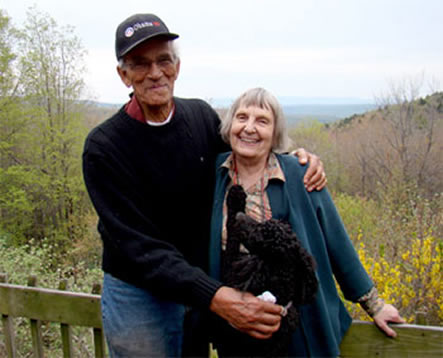
Emmett and Priscilla Bassett and rescued poodle, Thandi
By Barbara Upton
Every single day for three years, you could find him picketing against the cruelty of apartheid outside the South African Consulate in New York City. In 1985, you might have seen her getting arrested for blocking traffic on Lexington and 42nd Street to protest the paramilitary killing of innocent civilians in El Salvador. Meet Emmett and Priscilla Bassett of Grahamsville, New York, a deeply caring, compassionate and sweet couple who have dedicated their lives to the pursuit of peace and justice for all people. They model for us what dedication, courage and love looks like.
I always knew that they were an amazing couple, but traveling up the steep and winding road to their magical mountain home made me think, “They’re even more incredible than I thought!”. I imagined this octogenarian couple navigating this terrain every Saturday, in snowstorms and ice, traveling an hour to stand in our weekly vigil for peace. They are founding members of Women in Black in New Paltz, NY, and they have hardly missed joining us every Saturday for eight years!
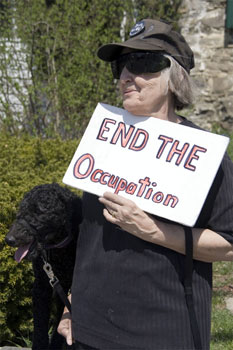
Priscilla at the weekly vigil
We, in Women in Black, like to think of them as our rock… our respected and valued elders. While talking to them over tea and homemade cranberry nut bread in their cozy kitchen, which gives the feel of being in a tree house with colorful birds at the window, it became clear that many organizations and friends hold them in the same high esteem.
Priscilla and Emmett met, appropriately enough, at a protest in 1948. Emmett, a WWII veteran was working on his Masters at the University of Massachusetts and Priscilla was a junior at Smith. They were picketing a roadhouse that refused to serve African Americans. They must have felt the winds of fate swirling around them for they both said it was love at first sight. They married two years later and it didn’t take them long to experience what life was like for an interracial couple living in America in 1950.
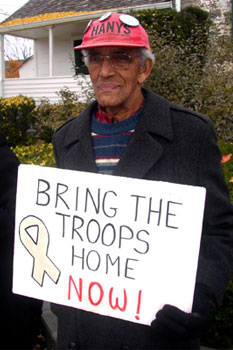
Emmett’s unwavering message
Imagine — they were young newlyweds, excited about their new lives together and had just moved all their belongings into their first apartment. They left for awhile and upon returning found they were locked out. The landlord had met only Priscilla previously and when he saw Emmett moving in, he changed the locks as soon as he could. They battled that landlord for two years to retrieve their belongings, but only got back a few blankets.
Priscilla said their next apartment “felt safe”. I was glad to hear that! I was still reeling from the idea that someone could lock you out of your own place and worse, there was little you could do about it. She then went on to say it was next to Skid Row. Leave it Priscilla to feel safe with the downtrodden. Priscilla added that the Catholic Worker, a relief house for the poor, was just down the street from them. From their apartment they could see the long lines of hungry people waiting to get free food. They must have felt right at home in such a caring neighborhood.
Their next stop was Columbus, Ohio where Emmett was working on his doctorate. Once again, they had difficulty finding a place to live, and ended up in an apartment with a sink that had no running water. They both seemed to find that amusing today, but it must have been rough with two little children.
Priscilla worked at GM, where she was a “committee woman”, the UAW term for a shop steward today. She later used the skills she learned there to organize librarians in New York City. They were both active in the Progressive Party and the NAACP.
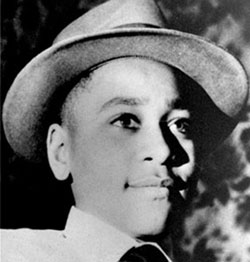
Emmett Till
It was at a NAACP meeting that Emmett took it upon himself to organize a fund drive for the mother of Emmett Till. Till was the 14 year old, African American boy who was beaten to death for whistling at a white woman in 1955. His mother bravely allowed an open casket at his funeral because she “wanted the world to see what they did to my baby.” Less than a month after the murder, an all white jury acquitted the two white defendants in 67 minutes. Those two men later admitted to killing the boy in Look magazine. It was the picture of Till’s mutilated face and body and the trial results that motivated many to devote themselves to the nascent civil rights movement.
“My son was just a baby then,” Emmett said. “If a young boy like Emmett Till could be murdered with impunity, it could happen to my own son. I knew I had to do something.”
He thought Emmett’s mother, Mamie Till Mobley might have to move to a safer location and wanted to show her the support of so many in the nation. His fundraising efforts were successful and he was featured in W.E.B. Dubois’s Crisis Magazine.
Priscilla was a member of the Women’s International League for Peace and Freedom, a peace organization that has been around for 90 years! She actively worked for Henry Wallace, vice-president under Roosevelt, who ran as the Progressive Party presidential candidate in 1948. He was the first candidate who refused to speak before segregated crowds. He traveled with his black assistants and they were often pelted with tomatoes in the south.
During this time, union leaders were pegged as secret communists. Emmett remembers going to the Columbus court house where union leaders were on trial. A group of professors’ wives asked him why he was there. “To make sure they are getting a fair trial,” was his reply. The atmosphere was tense in this Midwestern city in the early 50’s. At night they would sometimes receive frightening calls to “Come to the morgue to identify the body”. In Columbus, much was segregated. They couldn’t even take their two children to the town pool. But in her usual optimistic fashion, Priscilla lit up remembering the beautiful state park they discovered sixty miles away.
Emmett began his schooling in a one room segregated school house. Some years there was no teacher and he often missed six weeks of school during harvest time. In spite of all that, he was able to do his undergraduate work at Tuskegee. He worked under Dr George Washington Carver, the famous plant biologist, educator and inventor who “revolutionized agriculture in the South” and came up with 300 uses for peanuts, including using them as a biofuel. Although Dr Carver was born into slavery, as an adult, he was ahead of his time. Listening to Emmett, it was clear that Dr Carver was a very gentle and humble man. He liked the young students and enjoyed cooking for them. He also said Dr Carver had a kind of strange ritual he did upon meeting you. He would stroke your face, as though to check your facial hair.
Emmett went on to explain, “Dr Carver’s face was pretty smooth, with hardly any whiskers. My supervisor explained that this was the consequence of his being kidnapped and castrated as a young boy.”
Aghast, I asked why this was done. Emmett explained that it was thought that he might someday drive a carriage that would carry white women and unbelievably, in the 1800’s, castration was considered a requirement for that job. Yet, Emmett said, Dr Carver was not a bitter man. “He found happiness and honor in being helpful to the world” reads the epitaph on his grave.
After receiving his doctorate at Ohio State, Emmett sent his resume and transcripts to three businesses in Chicago. The response was enthusiastic. In days, he had three plane tickets and reservations at the best hotels. But the reception was very different when they met him. One man at the Beatrice Foods Company told him there wasn’t a single black person in all of their huge operation and that if he hired Emmett, which he wanted to do, that he would be fired.
Eventually, Emmett got a job as an assistant professor in Microbiology at Columbia University. He later taught at the New Jersey College of Medicine and Dentistry for 18 years and spent one year in Sweden working in the lab of Arne Teselius, who was a Nobel Laureate in Chemistry.
After graduating from Smith College, Priscilla had dreams of going to law school, but finances made that impossible. Her work career has been varied and impressive. In addition to working at GM, she worked like Rosie the Riveter in a factory for the summer during WWII. She also worked at the New York Public Library, Life Magazine and as the librarian in a number of progressive, independent schools in New York. She said she loved going back to school to receive her Masters in Library Science degree when she was 47.
But the real work of both of their lives has been in contributing to a better world- a world of peace and justice for everyone. Priscilla said that she was imbued with the Roosevelt spirit of the early 40’s that has stayed with her until this day.
They are both active in SLAC, The Seniors Legislative Action Committee of Sullivan County, New York. SLAC was revitalized in 2003, when Congress passed the prescription bill that was a boondoggle for the insurance and drug companies.
“We thought it was time that seniors picked up the “slack”, as our government needed to hear our voices,” she said.
Never doubt the energy that a group of fired up seniors can bring to causes they believe in! SLAC has stayed active in working on preserving Medicare and Social Security, for a more equitable property tax structure, clean elections, nursing home reform and protecting EPIC, the state insurance prescription program. Priscilla said that Rep Hinchey was their speaker last year, where he was challenged with seniors asking him why he didn’t support the impeachment of then President Bush.
Priscilla smiled her mischievous smile and said “Three days later Hinchey signed on to impeachment in the House. I think we seniors pushed him over the top!”
Priscilla is also vice president of the statewide Senior Action Committee and was named Volunteer of the Year by the County Office of the Aging. She’s on the Advisory Board for the State Office for the Aging and travels often to Albany to lobby for legislation to help senior citizens. Currently, she and SLAC are speaking out for Medicare for all — single payer health insurance. She adds that she tries to do helpful things, “like taking people to medical appointments, not just wonky things.”
She also fondly remembered her days with the Council on Interracial Books for Children. She said at the time there were hardly any books for children of color except Little Black Sambo. (She remembered water coloring faces in her young son’s books so that he could see children who looked like him.)The council helped black writers and illustrators to get published.
Emmett also has been and still is an office holder. He was appointed by the governor to be on the Human Rights Commission of Manhattan and is now on the Human Rights Commission in Sullivan County. He was one of the earliest organizers of the March on Washington with Bayard Rustin and A. Phillip Randolf . Emmett served on community boards working for better housing and schools in New York City for ten years. Both he and Priscilla were founding members of the Presbyterian Hospital Community Health Council (and Priscilla was President of it) to make the hospital more culturally appropriate and accessible to all, especially the poor Latino community that surrounded it.

Rally against Wall Street Banksters
During the interview, Emmett would sometimes shake his head and with his southern drawl say “Sometimes it is too much, our volunteering and activism adds up to full-time jobs!” There have been hundreds of marches, and demonstrations over the years. In every one, Emmett and Priscilla have always stayed true to their commitment to nonviolence, but sometimes their activism has been dangerous work. Priscilla remembers a police horse rearing up in front of her at a demonstration in Times Square. When I asked what they were demonstrating for, she laughed, “I can’t remember now, there have been so many causes.”
She also spoke of an event that resulted in a friend of theirs, a young medical student, being blinded in one eye. It happened sixty years ago in the Hudson Valley. It makes Priscilla’s and Emmett’s story even more compelling because it shows the depth of the hatred and violence of those times. This is what happened.
Paul Robeson, the great black singer, orator and actor was to perform September 4, 1949 in Peekskill, NY, home at the time of a chapter of the Klu Klux Klan. The week before, a Robeson concert had to be cancelled due to violence. A local mob attacked the concert goers with baseball bats, brass knuckles and rocks. Thirteen suffered serious injuries before the police intervened. Although there was great tension in the air for the second concert, 25,000 people attended. To protect them, 2,500 trade unionists linked arms and formed a human wall around the concert goers. All went well until the concert ended. As the black and white attendees left for their cars, they were ambushed by 500 racist vigilantes for three hours. Nine hundred local police and State Troopers egged the mob on and even joined in the assault. Some were dragged from their cars and beaten, and rocks were hurled through windows, which is how their friend lost his eye. Pete Seeger, who also performed that day, used some of the rocks thrown at him to build the chimney in his cabin in Beacon to always remember what happened. No one was ever charged with any crime and the mainstream press blamed Robeson for “daring to go where he isn’t wanted.”
“To this day,” Priscilla said, “It is one of my deepest regrets that I was not there.”
Suddenly, she pointed to four brightly colored woodpeckers at the feeder just a few feet from us. It was then that I noticed the fading light and realized we were just going to be able to skim the surface of these two lives- lives built on the mutual belief that every person has the power and responsibility to help create a better world. There is so much more, like their proclivity to open their home to those in need. Chinese students once lived with them and one who was there for two years became the Chinese Ambassador to Belgium. They also hosted South African exiles and helped one of them to get into Mount Holyoke. The stories can go on and on.
Although I began this story talking about them, they began by talking proudly and lovingly of their three children; Mitzi, a physician and past deputy commissioner of health in NYC; Jonathan, a lawyer and Lydia, a school principal and their three grandchildren, one a student at Scripps, another at Stanford and one is following in his grandmother’s footsteps as an organizer with the Service Employees International Union.
They continue to work the land around the cabin that Emmett and Jonathan built in the 60’s with a just a chainsaw and no electricity. Emmett especially loves to tend the vegetable garden and perfect his grafting on the many fruit trees they found growing wild years ago. Priscilla plants bulbs and flowers and often has their pets by her side; Thandi, a dog that came to them abused and frightened, who now wags her tail in greeting and often affectionately rests her paw gently on Priscilla and Ditey, short for Aphrodite, the cat. They continue to give generously of their time and many talents to the community and causes they love. This devoted couple is showing few signs of slowing down!
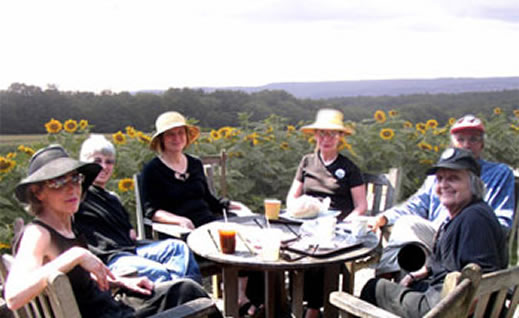
Coffee after the Vigil: Anne, Mary, Linda, Ellen, Emmett and Priscilla
Emmett did say he wished that more young people were involved as activists today. Priscilla agreed and talked about how participating in civic action and volunteering is “a richer way to live, than the mere accumulation of “things”. We never want to be cynical, because around the corner, things will be better, but only if we take a part,” she said. “It all starts with one,” she chuckled, “Well, in our case, two.”
Emmett and Priscilla Bassett — a true gift to this world and the best people I know to be the first to be recognized as Waking Planet’s “Ordinary People — Extraordinary Lives”.
Barbara Upton is the founder of Waking Planet which is dedicated to sharing and energizing a new vision for humanity that recognizes the inherent worth and dignity of every person and the sacredness of all life. “Ordinary People — Extraordinary Lives” is a regular feature of WakingPlanet.com, home of the world peace flag. It will highlight people who are living conscious, vibrant and compassionate lives and who, by their example, are helping humanity to awaken to its highest potential. This is the first in a series.

